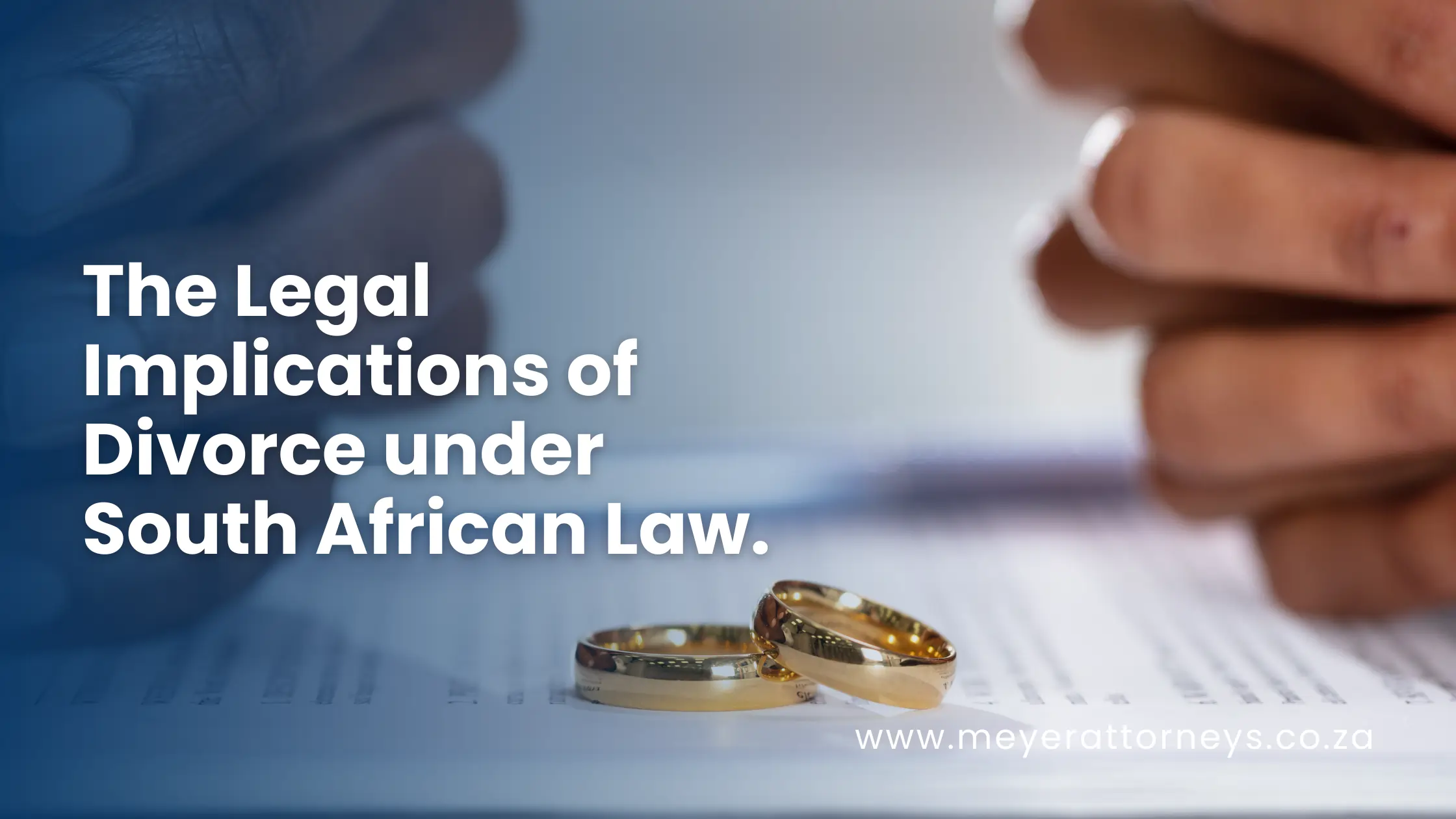The legal implications of divorce in SA.

What you need to know about the consequences of divorce.
The consequences of divorce are life-altering with far-reaching legal implications. In South Africa, the legal framework surrounding divorce is governed by a combination of statutes and common law principles designed to protect the rights and interests of both spouses. This article delves into the legal implications of divorce under South African law, including the grounds for divorce, division of assets, child custody, and spousal support.
Grounds for divorce.
Before looking at the primary consequences of divorce, it should be noted that South African law recognizes two primary grounds for divorce:
- Irretrievable Breakdown of the Marriage: This is the most common ground for divorce and is based on the fact that the marriage has irretrievably broken down, with no reasonable prospect of reconciliation. The breakdown can be proven through various factors, such as adultery, abuse, or living apart for an extended period.
- Mental Illness or Continuous Unconsciousness: If a spouse has been mentally ill or unconscious for a prolonged period and there is no hope of recovery, this constitutes grounds for divorce.
Division of assets is one of the primary consequences of divorce.
The division of assets in a divorce is subject to the principles of equitable distribution. In South African law, a marriage in a community of property means that all assets and liabilities are shared equally between the spouses. However, out-of-community property agreements are common, with separate assets and debts. Thus, the consequences of divorce in this regard will be largely governed by the marital regime of the parties.
Maintenance and spousal support.
One of the secondary consequences of divorce is Maintenance, or spousal support, which may be awarded to one spouse based on their financial need and the other spouse’s ability to pay. The court considers factors such as the duration of the marriage, the age of the parties, their financial circumstances, and their respective contributions to the marriage.
Child Custody and Access
Child custody and access arrangements are one the further consequences of divorce, especially when minor children are involved. South African law prioritizes the child’s best interests in determining custody and access. Shared custody, primary custody, or specific visitation schedules may be established to ensure the child’s welfare.
Divorce proceedings.
The legal process for divorce in South Africa involves several steps:
- Consultation with an Attorney: Both parties should consult divorce attorneys to understand their rights and responsibilities.
- Filing a Summons: The divorce process is initiated by filing a summons with the court. The summons outlines the relief sought, grounds for divorce, and any relevant details.
- Serving the Summons: The summons is served on the other party (the defendant) with a specified period to respond.
- Court Proceedings: If the divorce is contested, it may proceed to court, where both parties present evidence and arguments.
- Decree of Divorce: Upon satisfaction of the legal requirements, the court issues a decree of divorce, officially dissolving the marriage.
In conclusion.
Divorce under South African law involves a complex legal process with significant implications for both spouses. Understanding the grounds for divorce, asset division, spousal support, and child custody is essential to successfully navigating this challenging period and the consequences of divorce. Legal counsel is highly recommended to ensure that your rights are protected and the divorce proceedings are conducted in accordance with South African law. Divorce laws in South Africa aim to provide equitable solutions, safeguard the interests of children, and offer a fair resolution to both parties involved.
If you would like to learn more about marital regimes, click here.
If you would like to learn more about maintenance click here.
If you would like to know about the effects of an ante-nuptial contract click here.
If your query relates to a post-nuptial contract click here.
If you would like to know how to change your name after the divorce proceedings click here.
If you would like to know more about your parental rights and responsibilities click here.
If you would like to know more about spousal maintenance click here.
If you would like to know more about dealings with pensions during divorce matters click here.
If you would like to know more about shares in companies and divorce proceedings click here.
If you would like to know more about custody battles in SA click here.
If you would like a general overview on how divorce works in SA click here.
If you would like to know more about meditation in divorce matters click here.
If you would like to know more about divorce and financial planning click here.
If you would like to know more about updating divorce orders click here.
If you would like to know more about pendente lite divorce orders click here.
If you would like to know more about spousal maintenance applications click here.
This article is a general information sheet and should not be used or relied on as legal or other professional advice. No liability can be accepted for errors, omissions, loss, or damage arising from reliance upon any information herein. Don’t hesitate to contact Meyer and Partners Attorneys Incorporated if you require further information or specific and detailed advice. Errors and omissions excepted (E&OE).